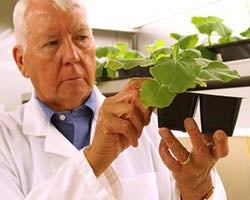Career Path for Charles Arntzen: The 'Godfather of Biopharming'
Fast Facts:
- Number of years in school: 23
- Favorite class / subject: Biology and Logic
- Hardest class / subject: Physical Chemistry
- First Job: Dishwasher
- Dream job as a kid: Astronaut. I can still remember standing with my dad in the backyard watching Sputnik going over. The idea of space travel was mesmerizing.
- One word you would use to describe your current job: Exciting
As a boy, when Charlie Arntzen looked out the window of his home in Granite Falls, Minnesota, he saw miles and miles of farmland. But even then technology was changing his world.
His father had switched from planting crops with the help of horses to using the help of powerful equipment instead. And genetic improvement in crops allowed his family to increase production.

This definitely affected the way Charlie thinks about food. “I believe reasonably priced and safe food is a human right," he said. He took "safe" food to another level though, focusing his work on using important crops to make life-saving medicines.
But Charlie’s path from Minnesota farm to a leader in the field of "pharming” (using plants to create drugs or pharmaceuticals) was not a straight one. Eager as he was to bring his new ideas to the world, he didn't do that well in college at first.
“At one point, I lost my standing at the University of Minnesota due to very bad grades,” he said. It took Charlie six years to get his bachelor’s degree in science. But meeting his future wife, Kathy, made Charlie get more serious about school. After they got married, he got nearly straight As. He finished undergrad work and went on to graduate school, where he got his Ph.D. in cell biology from Purdue University. Today, he is a Regents Professor at Arizona State University's School of Life Sciences.
Creativity Begins with a Banana
Charlie spent the first 15 years of his career working on ways to make crops produce more. Eventually, he learned that he could use his understanding of plants to help discover new solutions to health problems.

In 1992, an “aha moment” happened for Charlie. While on a visit to Thailand, he watched a mother feeding her baby a banana. He wondered, “Wouldn’t it be great if something as simple as a banana could protect a child from disease?"
If vaccines were cheaper and easier to use, Charlie thought, we could vaccinate some 30 million babies each year who don’t receive the protection from disease they need. Although vaccines are considered among the greatest tools for improving health, the cost is still too high for many poor countries.
For the next 20 years, Charlie focused on the possibilities of using plants to create medicines. For one project, he put hepatitis B vaccines into tomatoes. For others, he used potatoes and yes, bananas. He moved his work to Arizona State University, where a big focus is to find new solutions to global problems.
Read more about: Tobacco's Wild Ride
Bibliographic details:
- Article: Career Path: Charles Arntzen
- Author(s): Dr. Biology
- Publisher: Arizona State University School of Life Sciences Ask A Biologist
- Site name: ASU - Ask A Biologist
- Date published:
- Date accessed:
- Link: https://askabiologist.asu.edu/career-path-charles-arntzen
APA Style
Dr. Biology. (). Career Path: Charles Arntzen. ASU - Ask A Biologist. Retrieved from https://askabiologist.asu.edu/career-path-charles-arntzen
Chicago Manual of Style
Dr. Biology. "Career Path: Charles Arntzen". ASU - Ask A Biologist. . https://askabiologist.asu.edu/career-path-charles-arntzen
Dr. Biology. "Career Path: Charles Arntzen". ASU - Ask A Biologist. . ASU - Ask A Biologist, Web. https://askabiologist.asu.edu/career-path-charles-arntzen
MLA 2017 Style

Growing up on a farm had Charles Arntzen thinking about how to put plants to good use from an early age.
Be Part of
Ask A Biologist
By volunteering, or simply sending us feedback on the site. Scientists, teachers, writers, illustrators, and translators are all important to the program. If you are interested in helping with the website we have a Volunteers page to get the process started.

